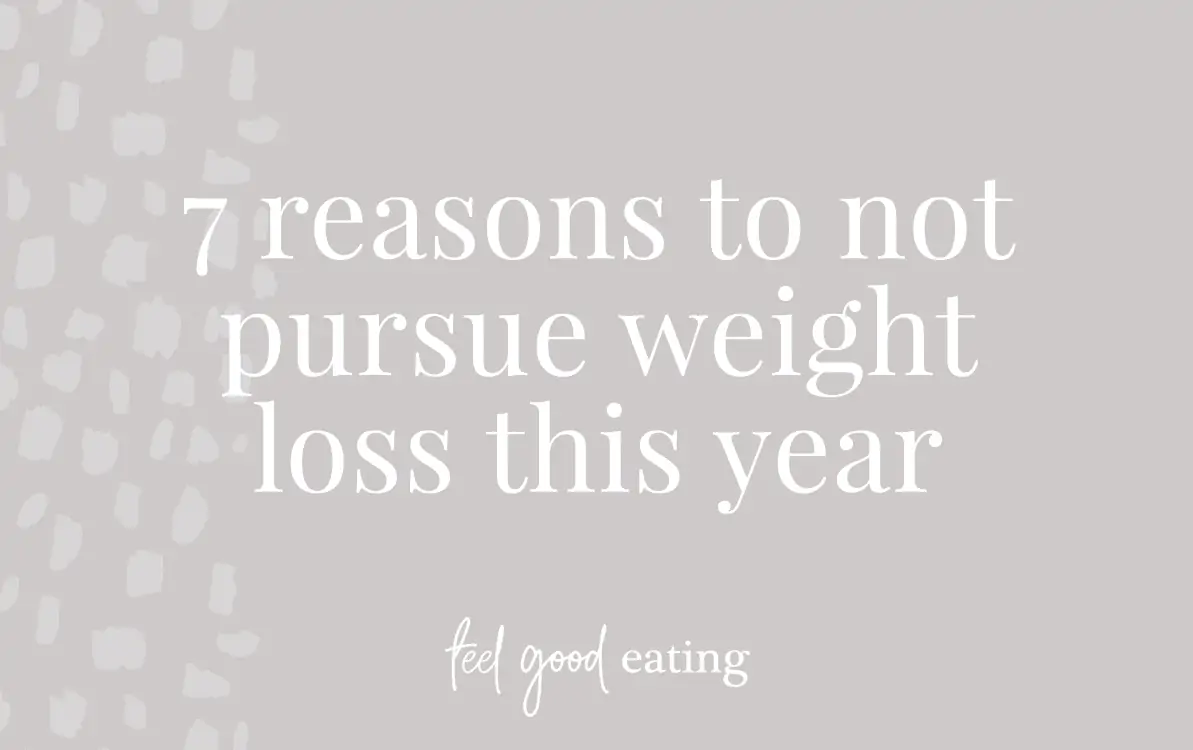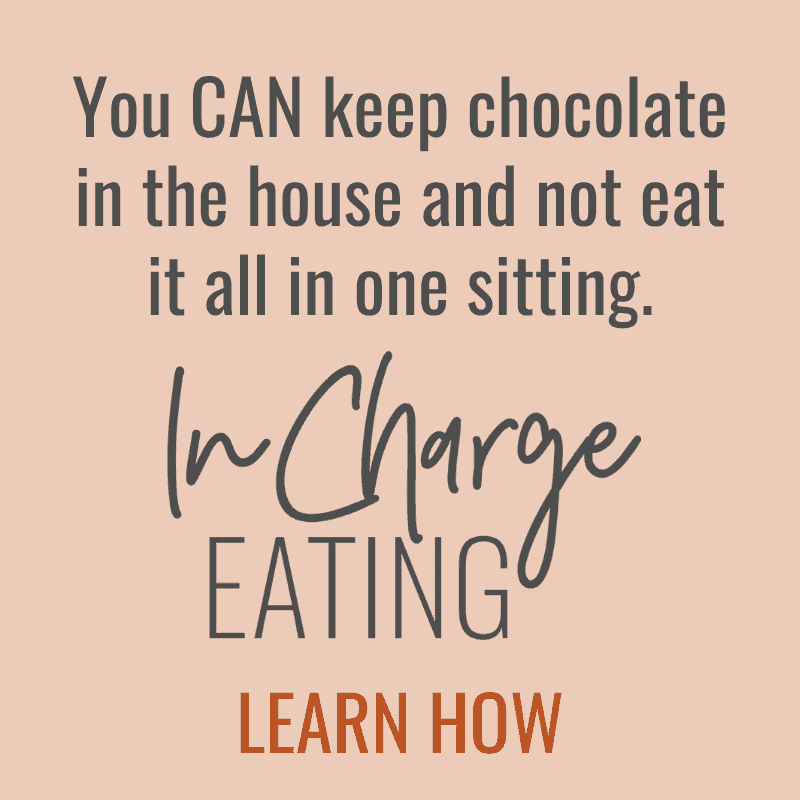Get ready.
We are about to feel the full force of International Dieting Month.
Otherwise known as January!
Those of us in the non-diet space refer to it as International Dieting Month as it is the time of year where the dial on weight loss messages will be cranked right up to maximum fear mongering levels.
But if you are reading this, I am going to invite you to take a pause and consider NOT pursuing weight loss this year. Or next year. Or any year!
Why?
Well, let’s start with the seven reasons I have provided below. To be honest, there are MANY more reasons than the seven I have included here, but these are a good first start!
1. diets don’t work
I could just finish the article right here with this reason to not pursue weight loss.
We have DECADES of scientific evidence showing that weight loss through dieting is successful for around 18 months at best.
What we DO know to be true about weight loss dieting is that regardless of the method, they all have a very, very low chance of working in the long term.
Even Australia’s leading expert body guiding public and individual health standards has found after reviewing the evidence that for ‘lifestyle interventions’ (because that is what we disguise diets as these days), weight regain is a certainty after 2-5 years.
#fail
2. weight loss doesn’t equal health
Yes, you heard me right.
If you are thinking of pursuing weight loss to be ‘healthier’, you might be surprised to know that losing weight doesn’t automatically improve your health. That is simply because weight is only ASSOCIATED with health outcomes, it is not the primary CAUSE.
Association is very different to causation.
Improving cardiovascular health, blood pressure, blood glucose levels, energy levels etc. can all be achieved independently of losing weight.
In fact, the repeated pursuit of weight loss (aka weight cycling) often leads to poorer health outcomes. And let’s not forget the scientific evidence that has found people of higher weights live longer than people of lower weights.
And all of that doesn’t even begin to take into account that many eating disorders and disordered eating begin as innocent attempts to pursue weight loss.
3. restriction often leads to bingeing
No matter your method, diets for weight loss all have one thing in common: restriction.
Eating Paleo = restriction
Intermittent fasting = restriction
Clean eating = restriction
Portion control = restriction
Sugar free = restriction
Eat ‘healthy’ with a ‘cheat’ meal once a week = restriction
Low carb, high fat = restriction
Do you know what our bodies don’t like and will rebel against Every. Single. Time?
Restriction.
And it does this by ramping up your obsession with ‘off limits’ foods to the point that you end up ‘falling off the wagon’ and eating those off limits foods in volumes and ways that make you feel like you are out of control.
It is a basic survival mechanism because no matter what YOUR intention is with restricting food (or whether you consciously feel deprived or hungry), your body thinks you are starving it and will do whatever it needs to make sure you don’t threaten its existence.
Clever body!
4. you will be buying into a multi-billion dollar industry designed to make you feel bad about yourself
No matter how caring or helpful that program or coach or celebrity seems, underneath it all, they ARE using marketing strategies to make you feel like your body is a problem that needs fixing and THEY have the perfect solution – all for 12 easy payments of $99.
5. it is the quickest way to develop a poor relationship with food and your body
The pursuit of weight loss takes you outside of your body and asks you to put all of your trust and decision making power in external factors.
Like what the number on the scale is.
Or, how big the plate is that you are serving your meals on.
Or, you can’t eat carbs after 7pm.
Or, you can’t be hungry because you just ate breakfast.
Or, that feeling of light-headedness and like you might pass out is just your body ‘ridding itself of toxins’ and you just need to push through it.
And the list goes on
The further you disconnect from your body through these external factors, the more foreign and ‘wrong’ your body can feel, increasing that urge to ‘fix’ it.
Your body is your home and the relationship you have with it is going to be the single most important one you have in your whole life. Surely you would prefer one that feels safe and comfortable, rather than always feeling like you are at war with it?
6. because reaching your ‘goal’ is not going to automatically change your life
No matter how much you lose it will never be enough.
Because 99.9% of the time, what you are trying to achieve with pursuing weight loss is not about the actual weight.
7. there is more to life than pursuing weight loss
The pursuit of weight loss requires a massive amount of mental energy what with all of the fixation on food rules, numbers, counting, meal prep, label reading, portioning, tracking etc.
Imagine what you are missing out on in life now and what you COULD do with all of that mental space freed up to devote to more meaningful pursuits?
At the end of the day, what you decide to do with and to your body is 100% up to you. The question is, what will it cost you to pursue weight loss – not just financially, but physically, mentally and emotionally to do it?
do you have another reason to add to the list?
Originally published December 2017


 Hi! My name is Nina.
I’m a Certified Intuitive Eating Counsellor taking the ‘diet’ out of Dietitian. I am here to help you reject diet culture, tune into your body’s own inner wisdom about how to truly nourish yourself and ultimately feel good eating™
Hi! My name is Nina.
I’m a Certified Intuitive Eating Counsellor taking the ‘diet’ out of Dietitian. I am here to help you reject diet culture, tune into your body’s own inner wisdom about how to truly nourish yourself and ultimately feel good eating™ 

There is so much pressure out there right now with daily emails and pop ups. It sure can make someone feel bad about themselves. Great thoughts!
Thank you Deborah 🙂
Than you for sharing this – it’s important for people like me (who have a bad relationship with food) to hear!
Glad it helped Becca
I love this! It’s so important to focus on overall health all year instead of unhealthy restrictions for a few weeks a year! Thanks for putting this together!
Thanks Rachel